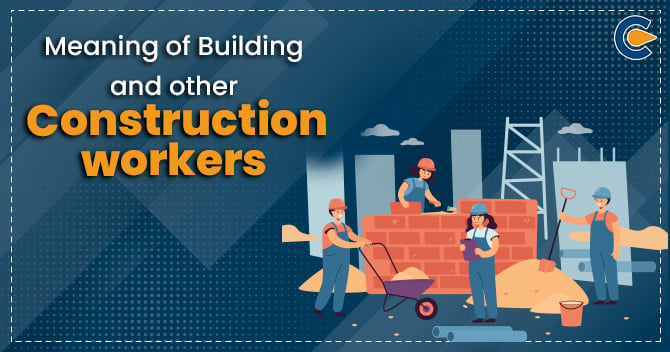The Building and other Construction Workers (BOCW) Act is a welfare statute which aims to provide a safe and healthy working environment to the workers engaged in construction activities. The act was introduced to provide a solution to issues related to Building and other construction workers. The aim of the act is to look after the working and employment conditions of the workers employed in construction work. In India, the construction industry is huge and is labour intensive sector; most workers involved in construction industries are unskilled, unorganized and working in miserable conditions. BOCW act ensures the Building and construction workers are not being exploited at any cost, and safe and healthy working conditions are being provided to them
Definition of Building and other construction workers
As per the section 2(e) of the Building and Construction workers Act “building worker” includes any person who is employed to do any skilled, semi-skilled or unskilled, manual, supervisory, technical or clerical work for hire or reward, in which the terms are either expressed or implied in connection with Building or other construction work, but it does not include any such person
- who is employed to do managerial or administrative work
- who is employed to do supervisory work and earns wages more than one thousand six hundred rupees every month or engaged in managerial work wither by reason of the duties attached to the office or powers vested in him
From the definition, it’s clear the Building and construction worker is someone who is extensively engaged in Building n construction work.
What is building and construction work?
According to section 2(d) of the act, “building or other construction work” includes any the construction, alteration, repairs, maintenance or demolition work of buildings, streets, roads, railways, tramways, airfields, irrigation, drainage, embankment and navigation works, flood control works which includes stormwater drainage works. The definition also includes in this ambit generation, transmission and distribution of power, waterworks, electric line, oil and gas installations, wireless, radio, television, telephone, telegraph and overseas communications, dams, canals, reservoirs, watercourses, tunnels, bridges, viaducts, aqueducts, pipelines, towers, cooling towers, transmission towers etc as specified in this behalf by the appropriate Government, by notification time to time.
As per the sample survey conducted by the National Sample Survey Organization (NSSO) in 2011 -2012, nearly about Five cores workers are engaged in construction work. As per the survey, there is a total of 50 crore workforce in the country, out of which 10% of the total workforce are engaged in construction work. The role of Building and construction workers is huge in nation-building, and yet this workforce is the most neglected one.
It is important to note that building and construction workers need social and welfare protection and, therefore, must be registered with the state welfare board as per the said act in order to avail of social and welfare benefits.
Building and construction workers as beneficiaries
Every Building worker who has completed the age of 18 years but is below the age of 60 years and has been engaged in building construction work for not less than 90 days in the preceding 12 months is eligible to get registration as a beneficiary. A worker registered as a beneficiary is entitled to get benefits from the board from its fund under this act.
Registration of Building and other construction workers as beneficiaries
- Registration Application is to be made in the prescribed format to the officer appointed by the board for this purpose
- Application made to the authorized officer must be accompanied with the fees not exceeding Rs50 as the case may be
- If the authorized officer is satisfied that the applicant has complied with the provisions of the act, then he will register the name of the Building and construction worker as beneficiaries.
- in case the officer is not satisfied with the application of the worker, he can reject the application but not without giving the opportunity of being heard
- an applicant aggrieved by the decision of the authorized officer can appeal to the secretary of the board or any other officer authorized for the same within thirty days from the date of such decision
- appeal by the aggrieved worker will be entertained after the expiry of thirty days only if the secretary or officer in charge is satisfied with the reasons given for the delay in filing the appeal
Cessation as a Building and other construction workers as a beneficiary
As per section 14 of the BCOW act, A building or construction worker registered as a beneficiary will cease to be a beneficiary[1] when he attains the age of 60 years or is not doing Building or other construction work for not less than ninety days in a year. The calculation of 90 days will exclude the period in which a Building or construction worker is absent due to any personal injury or accident caused during the course of employment.
The registered beneficiary under this act is entitled to contribute to the beneficiary fund until he attains the age of sixty years at the rate per month prescribed by the Government; by notification, the Official Gazette and rate of contribution differ according to the classes of Building and another construction worker. If the beneficiaries are not able to contribute to the fund because of financial hardship, the board can waive off the payment of contribution for a period not exceeding three months at a time. The employer, as per the act, deducts the contribution from the monthly wages and remits the same to the board within fifteen days.
The beneficiary will cease to be a beneficiary on the ground of non-contribution of fund for a continuous period of not less than one year. If the board is satisfied with the ground of delay in nonpayment of funds and the beneficiary is ready to pay the arrears, the registration of beneficiaries will stand restored.
Conclusion
It is applaudable that the Government of India has made social welfare statute for building and construction workers who have been neglected for ages. Although there are a few loopholes in the act, it still caters a lot of benefits to the Building and other construction workers. The Supreme Court, through its judgment, has clarified the Building and construction workers engaged in the factory are entitled to welfare benefits under the Building and construction work act.
Read our Article:Contract Labour Act: A Synopsis of Key Provisions












